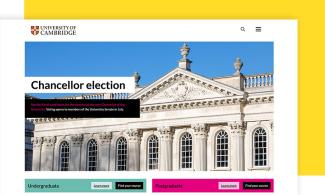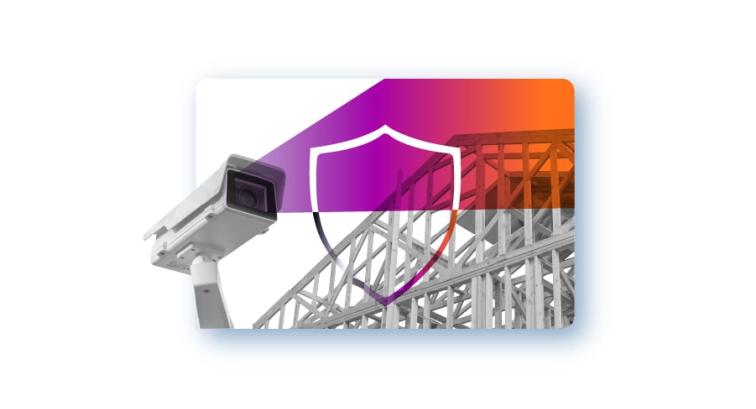Filters
Content Type
Topics
Drupal’s Security: Best Practices
Whether you're running a small blog, a bustling e-commerce site or a corporate portal, ensuring that your platform is safe from threats is a top priority. However, it's not simply a matter of “secure” or “not secure.”
Image
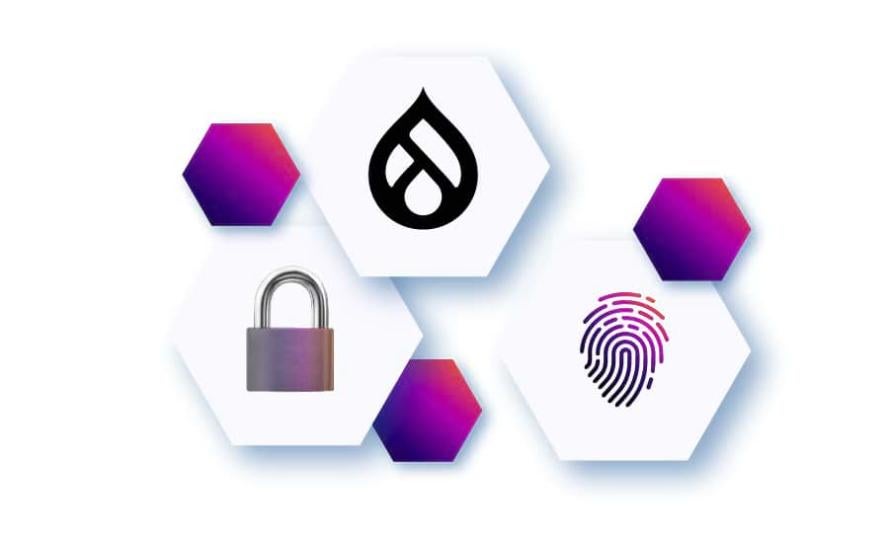
Drupal is considered a highly secure content management system when properly configured and maintained. The platform includes built-in protection against common web vulnerabilities. Government agencies and financial institutions choose Drupal for its enterprise-grade security features.
Instead of simply categorizing issues as “high”, “medium” or “low” severity. Drupal uses a 25-point scale to score security vulnerabilities. The scoring system evaluates exploitability, impact, and required privileges. Scores of 15-20 indicate critical vulnerabilities requiring immediate attention. Scores above 20 represent severe threats that could compromise entire systems. A score of 25/25 triggers immediate security alerts to all users. However, most security issues fall somewhere in the middle. They still require an immediate response, but don’t send everyone panicking.
This nuanced approach acknowledges that security is not black and white and allows the Drupal community to better assess the severity and impact of security issues.
That’s how Drupal earned the trust of some of the most security-conscious organizations like NASA, innovators like Tesla, and a host of government entities across the United States. High-security organizations choose Drupal over other platforms for its dedicated Security Team because:
- Drupal's structured vulnerability disclosure process exceeds industry standards.
- The platform's granular permission system provides more precise access control than alternatives.
- Government agencies specifically select Drupal for compliance and security requirements.
In this article, we’ll demystify Drupal’s security and discuss best practices to ensure your site remains a safe and trusted place for your users.
Is Drupal secure? The open source issue
When managing a website, one of the first questions many people ask is, “Is my platform secure?” For Drupal users, this question is often accompanied by concerns specific to open source software.
By nature, open source software is a bit of an open book – anyone can view the code. This transparency might seem like a double-edged sword. On one hand, malicious actors can spot vulnerabilities. On the other, being open source means a vast community of developers and users can scrutinize the code for any weaknesses. This collective scrutiny leads to the rapid identification and patching of vulnerabilities.
Essentially, Drupal's security is continuously being tested and reinforced by an active, engaged community:
- The Drupal Security Team investigates and verifies all reported vulnerabilities.
- The team publishes security advisories every Wednesday for predictable maintenance scheduling.
- Anyone can report security issues confidentially through Drupal.org's security reporting process.
- The Drupal Steward program provides web application firewall protection while sites await patches.
This collaborative effort means Drupal is robust in its security measures and proactive with constant updates and improvements.
While Drupal's security infrastructure is robust, it's crucial to understand that this protection only applies to supported versions. Sites running outdated versions face serious security risks.
Critical warning: Drupal 7 end-of-life
Drupal 7 reached end-of-life in January 2025. Sites running Drupal 7 no longer receive security updates from the community. Outdated Drupal 7 sites face significant risk from unpatched vulnerabilities. Organizations using Drupal 7 should migrate immediately to avoid security breaches.
Common Drupal vulnerabilities
Understanding the specific vulnerabilities that can affect Drupal sites is essential for implementing effective security measures. While Drupal's core provides robust protection, knowing how these threats work – and how Drupal defends against them – helps you make informed security decisions.
Cross-Site Scripting (XSS)
Cross-site scripting occurs when attackers inject malicious scripts into web pages. Once injected, XSS attacks execute harmful code in users' browsers. To prevent this, Drupal's Form API validates and sanitizes all user input. The Twig templating engine provides automatic output escaping.
SQL injection
SQL injection involves inserting malicious database queries through input fields. Attackers use SQL injection to steal or delete database information. Drupal's database abstraction layer uses parameterized queries by default. The API prevents direct SQL query construction from user input.
Remote Code Execution (RCE)
Remote code execution allows attackers to run malicious code on servers. RCE vulnerabilities can compromise entire websites. Drupal's code review process identifies and prevents RCE vulnerabilities. The 2018 Drupalgeddon 2 vulnerability was a critical RCE example.
Cross-Site Request Forgery (CSRF)
Cross-site request forgery tricks users into executing unwanted actions. CSRF attacks exploit authenticated user sessions. Drupal's Form API uses token validation to prevent CSRF. Each form submission requires a unique security token.
Cross-Site Request Forgery (CSRF)
Cross-site request forgery tricks users into executing unwanted actions. CSRF attacks exploit authenticated user sessions. Drupal's Form API uses token validation to prevent CSRF. Each form submission requires a unique security token.
Out-of-date themes and modules
One of the most straightforward paths to vulnerability is through outdated components. Keeping themes and modules updated is crucial, as these updates often include security patches.
Drupal security best practices
The most critical Drupal security steps include keeping core updated, implementing two-factor authentication, and configuring proper permissions. Regular security audits identify potential vulnerabilities before exploitation. Automated backups ensure quick recovery from security incidents.
Ensuring your Drupal site remains secure isn’t a one-and-done deal. It demands regular attention and assessment to stay ahead of potential threats. This dynamic nature of security underscores the importance of adopting a proactive stance and continuously evaluating and enhancing security measures to safeguard your online presence effectively. Here’s how:
Regular updates and patches
Your Drupal site’s security hinges on promptly applying updates and patches. These updates frequently address vulnerabilities that malicious actors could exploit. Neglecting them exposes your site to potential attacks.
With Pantheon’s Autopilot feature, this critical process is streamlined as it automatically updates your site, guaranteeing that you consistently operate on the latest and most secure version.
User account security
Robust user account security starts with enforcing strong password policies. Drupal’s built-in password strength indicators can help guide users in choosing secure passwords. Drupal uses granular role-based access control (RBAC) for permission management:
- Apply the principle of least privilege when assigning user roles. This ensures users have only the minimum access needed to perform their jobs.
- Grant users only the minimum permissions required for their tasks.
- Avoid assigning administrative permissions like "administer modules" to non-admin users.
Beyond role configuration, regularly audit user accounts and remove access for inactive users. Disable the default administrator account (uid 1) when possible.
Pantheon enhances this aspect with Role-Based Access, allowing for fine-tuned access control over user permissions, and supports SAML/SSO for even stronger security measures.
Security modules
Essential Drupal security modules protect against common attack vectors. Every Drupal site should install core security modules for comprehensive protection.
The Drupal community has developed thousands of security modules, each designed to address specific security concerns. Here are a few key ones:
- CAPTCHA and reCAPTCHA: These contributed modules help protect your site from spam and abuse by ensuring that actions are performed by humans, not bots.
- Security kit: This module provides a set of security-hardening features, helping protect against a range of common web vulnerabilities.
- Two-factor authentication (2FA): 2FA adds an extra layer of security by requiring users to provide two forms of identification when logging in.
- Password policy: Enforces rules for password strength and expiration to help ensure users create secure passwords.
- Automated logout: Automatically logs users out after a period of inactivity, reducing the risk of unauthorized access.
- Security review: Scans sites for misconfigurations and vulnerabilities. The module checks file permissions and user account settings.
- Login security: Prevents brute-force attacks by limiting login attempts. The module can block IP addresses after repeated failures.
Monitoring and security updates
Staying informed about security vulnerabilities is crucial for maintaining a secure Drupal site. The Drupal community has established reliable channels and tools to help administrators stay ahead of potential threats.
Subscribe to Drupal security advisories at Drupal.org for immediate notifications. Security updates are released every Wednesday for predictable maintenance. The Drupal status report page shows pending security updates. Enable update manager module to receive in-site notifications. Check /admin/reports/status regularly for security warnings.
Security scanning tools
Drupal's built-in security features provide strong protection, but proactive scanning helps identify potential vulnerabilities before they can be exploited. A combination of automated tools and professional assessments provides comprehensive security coverage.
The Security Review module performs automated security scans. OWASP ZAP provides external vulnerability scanning for Drupal sites. Drupal's built-in status report identifies common security misconfigurations. Professional security audits offer comprehensive vulnerability assessments. Acquia and Pantheon provide integrated security scanning services.
Database security
Secure database management, including regular backups and encryption for sensitive data, is essential. Pantheon’s automated backups ensure that your data is securely stored and easily recoverable, providing peace of mind and safeguarding against data loss.
HTTPS and SSL
Securing user connections and data transfer with HTTPS is non-negotiable in today's web environment. Pantheon automatically provides HTTPS certificates, ensuring that all data transmitted to and from your site is encrypted and secure.
Security audits and regular monitoring
Conducting regular security audits is a key practice in identifying potential vulnerabilities. Pantheon’s Automated Site Monitoring provides an additional layer of security, keeping a vigilant eye on your site’s status and health.
Firewall and DDoS protection
A robust firewall and DDoS protection defend your site against malicious attacks. Pantheon provides comprehensive Web Application Firewall (WAF) and DDoS protections, helping shield your site from a wide array of threats.
Drupal security hardening with Pantheon's tools
Pantheon elevates Drupal security to new heights with a suite of advanced tools designed to fortify your web presence against sophisticated threats.
Image
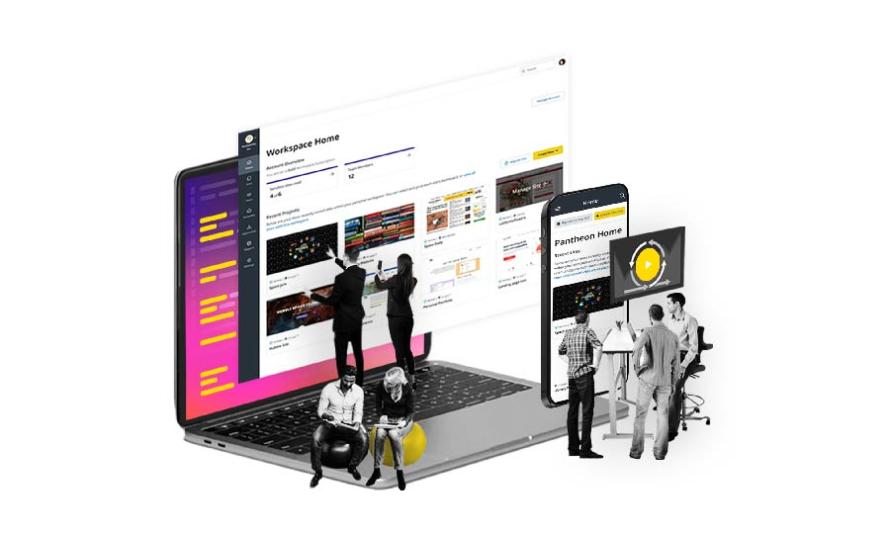
Among these, Pantheon’s Advanced Global Content Delivery Network (CDN) and Web Application Firewall (WAF) offer exceptional security benefits:
- Geolocation Detection and Blocking: Allows or blocks access based on geographic location, providing an effective tool against region-specific threats.
- IP Allow/Blocklisting: Enables you to control access to your site more granularly by specifying which IP addresses are allowed or blocked.
- Edge Logging: Offers real-time insights into your traffic, enabling quick identification and response to any suspicious activities.
- Custom Rules and Redirects: Tailor security measures to fit your specific needs, offering flexibility and enhanced protection against a variety of attack vectors.
Pantheon’s best practices For maintenance and updates across your sites
Pantheon significantly enhances web performance at scale by automating tasks and streamlining workflows. Here are some of the top features:
- Centralized Management: Pantheon’s dashboard streamlines the management of your digital portfolio, making it easier to maintain and update multiple sites. This centralized management tool simplifies the workflow, saving time and reducing the potential for errors.
- Testing and Quality Assurance: With Pantheon’s Dev, Test, Live environments, you can rigorously test updates in a controlled setting before making them live. This ensures any changes, including security updates, are fully vetted and won’t negatively impact your site’s performance or user experience.
- Automated Workflows for Updates: Autopilot automates the update process, keeping your site’s core, themes and plugins up to date with minimal oversight. As Christopher Whyte, Director of Technology at Health Resources in Action (HRiA), notes, “Autopilot not only saves time but also ensures that updates are reliably applied, enhancing site security and performance”.
- Continuous Monitoring: Pantheon continuously scans for vulnerabilities, providing timely security alerts and recommendations. This proactive monitoring ensures that potential threats are identified and addressed promptly, maintaining the integrity of your site.
- Automated Backups and One-Click Updates: These features simplify the process of keeping your site secure and functional, ensuring that you have recent backups and can quickly apply updates as they become available.
- Immutable Code: To further secure your site, Pantheon implements immutable code in the Test and Live environments, which means that code is write-protected. This prevents unauthorized changes, ensuring that only approved updates are implemented, thus safeguarding your site against unauthorized modifications.
Pantheon in action: Adaptive
Adaptive, a UK-based Drupal agency, dramatically reduced its security management workload by nearly 96% after switching to Pantheon's Advanced Global CDN (AGCDN). Previously challenged by managing multiple configurations across 30 sites with Cloudflare and AWS WAF, Adaptive found relief in AGCDN's streamlined, efficient security solutions.
Image
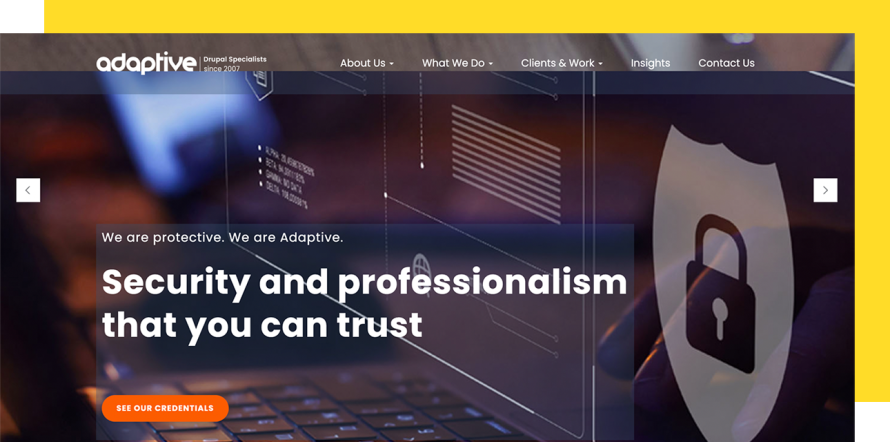
This move simplified infrastructure management, allowing their team to focus on core business activities and improved site performance and security, providing a one-stop solution with minimal maintenance requirements. As Dan Frost, Managing Director at Adaptive said, “AGCDN is not just about cost savings. It’s the hearts and minds of our team having the surety to deliver on our service.” This strategic shift underscores the benefits of integrated WebOps platforms for scalable, secure digital management.
Take your Drupal security to the next level with Pantheon
Drupal's robust platform, coupled with proactive security practices, offers a strong foundation for building secure websites. However, the dynamic nature of cybersecurity threats means that vigilance and ongoing maintenance are crucial.
Regular updates and patches, the deployment of security modules and the necessity of secure logins play a pivotal role in safeguarding your Drupal site. By emphasizing these practices, we aim to empower you, the reader, with the knowledge and tools to ensure your site remains as secure as possible.
Pantheon, the fastest Drupal host on the planet, dramatically simplifies the process, making the implementation of these security best practices more straightforward and enhancing your site's overall security and performance. From automated updates with Autopilot to Advanced Global CDN features and rigorous monitoring, Pantheon provides an invaluable layer of protection and efficiency. This unique combination of speed, security and convenience positions Pantheon as an essential partner in your website’s success.
Don't let the complexities of web security overwhelm you. Reach out to a Pantheon expert today and discover how we can elevate your Drupal site's security to the highest standard!
